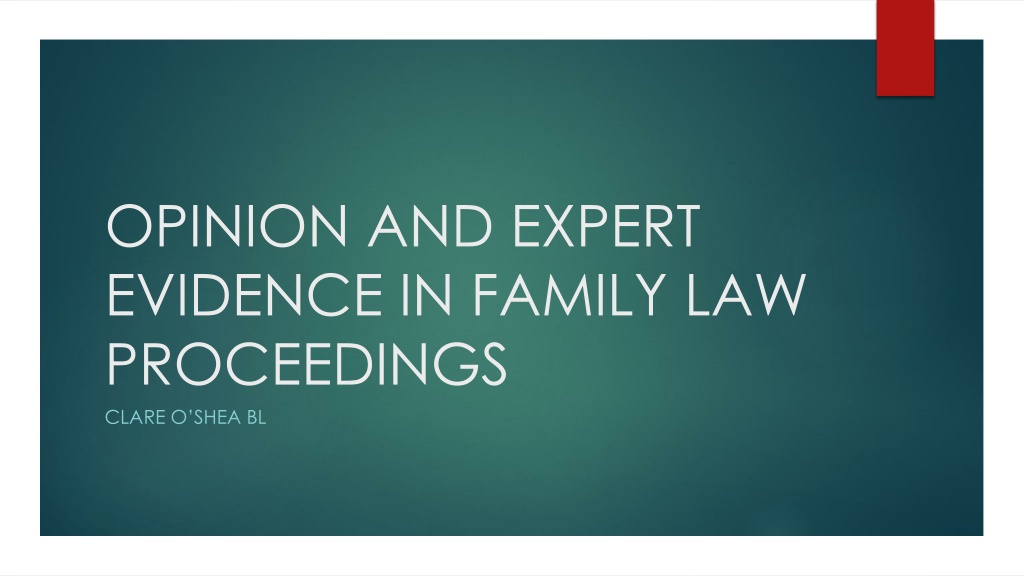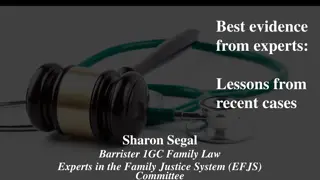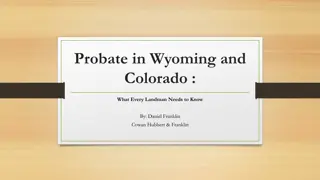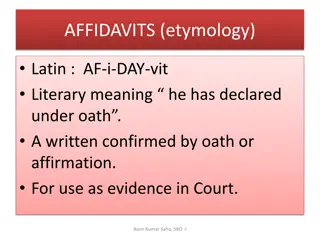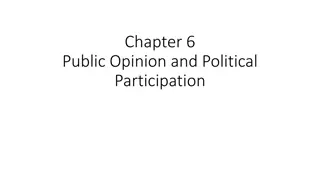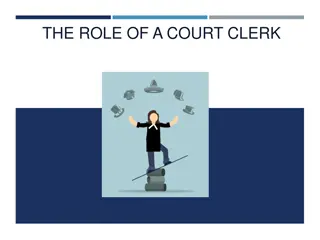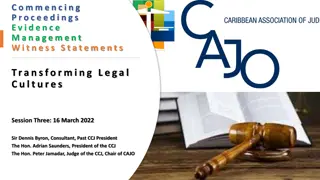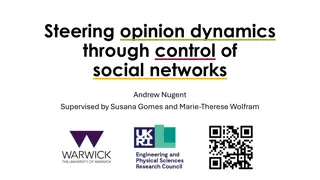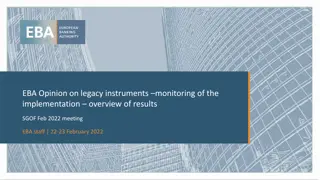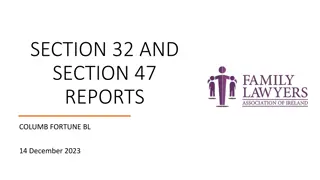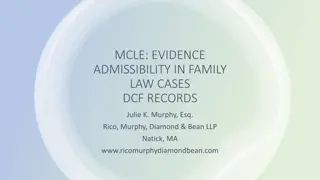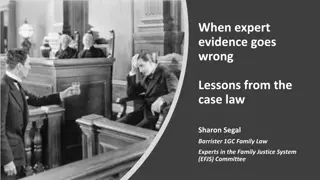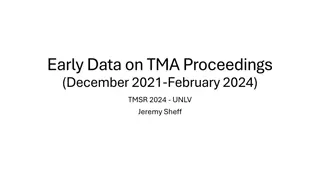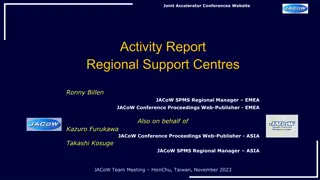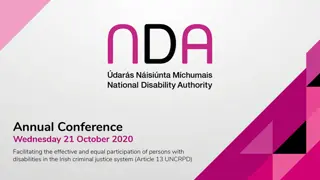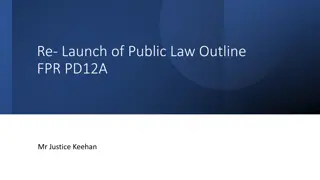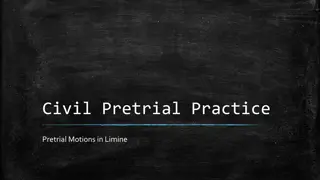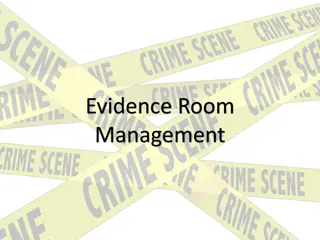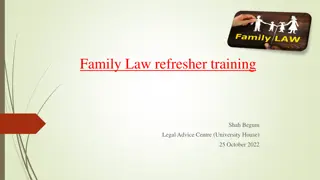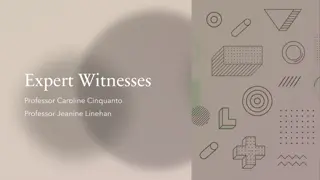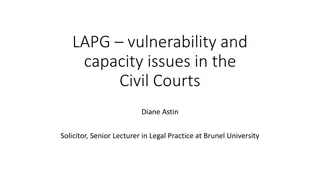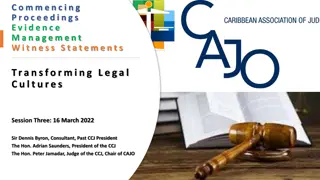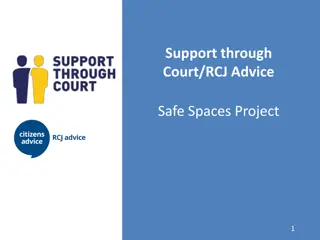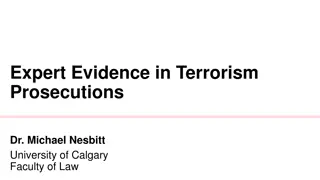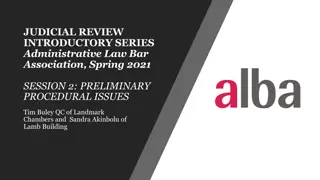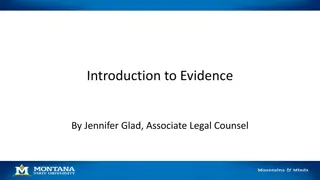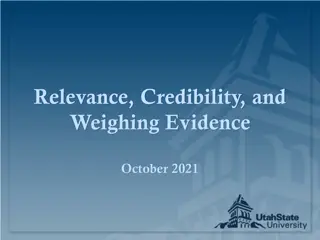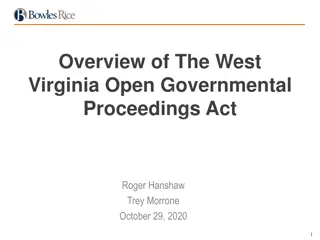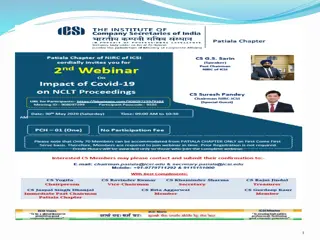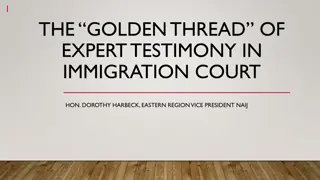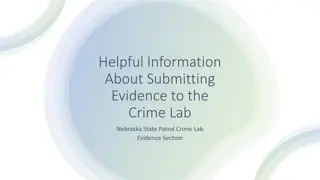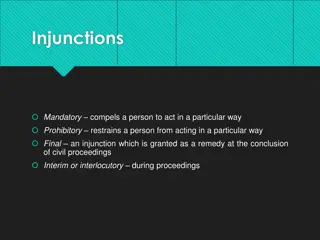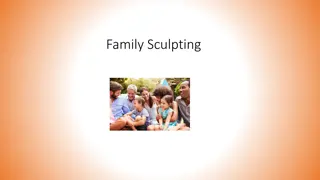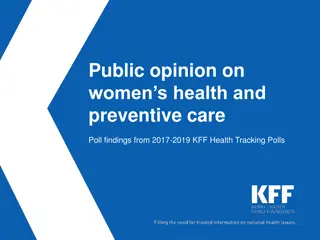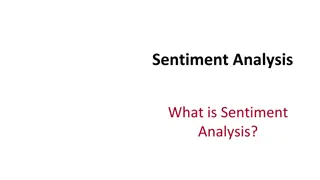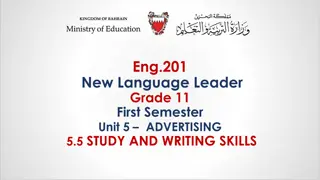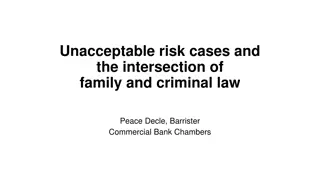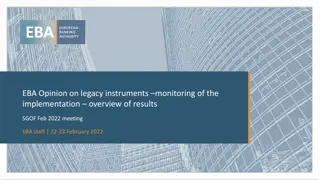Expert Opinion and Evidence in Family Law Proceedings
In family law proceedings, witnesses are generally not allowed to give opinions unless they are experts in their field. The Exclusionary Rule prohibits witness opinions to ensure the reliability of evidence presented before the court. However, there are exceptions to this rule, such as expert witnesses providing testimony within their expertise. Expert opinion evidence is permitted to assist the court in making informed decisions, with the judge ultimately relying on this input. The role of expert witnesses, like the Single Joint Expert, plays a crucial role in assisting the court in understanding complex issues within family law cases.
Download Presentation

Please find below an Image/Link to download the presentation.
The content on the website is provided AS IS for your information and personal use only. It may not be sold, licensed, or shared on other websites without obtaining consent from the author. Download presentation by click this link. If you encounter any issues during the download, it is possible that the publisher has removed the file from their server.
E N D
Presentation Transcript
OPINION AND EXPERT EVIDENCE IN FAMILY LAW PROCEEDINGS CLARE O SHEA BL
THE EXCLUSIONARY RULE General rule - witnesses must only speak to facts which they themselves have observed. Why? Up to judge/jury to draw inferences of fact, form opinions and come to conclusions; Prohibition of such evidence because factors such as prejudice, faulty reasoning and inadequate knowledge may undermine the reliability of the opinion expressed but may not be evident to the tribunal of fact
AG (RUDDY) v KENNY AG (Ruddy) v Kenny (1960) 94 ILTR 185 It is a long standing rule of our law of evidence that, with certain exceptions, a witness may not express an opinion as to a fact in issue. Ideally, in the theory of our law, a witness may testify only to the existence of facts which he has observed with one or more of his own five senses. It is for the tribunal of fact judge or jury as the case may be to draw inferences of fact, form opinions and come to conclusions
EXCEPTIONS TO THE EXCLUSIONARY RULE Two exceptions (AG (Ruddy) v. Kenny): 1. Expert witnesses may give evidence as to matters within the sphere of their expertise; 2. Non-expert witnesses may, in certain circumstances, give what might be regarded as opinion evidence, where the tribunal of fact is not in as good a position as the witness to make the inference, or where it is simply expedient to admit such evidence.
WHY IS EXPERT OPINION EVIDENCE PERMITTED? Flynn v Bus tha Cliath [2012] IEHC 386 Charleton J (High Court) Entitlement of an expert to express an opinion was predicated upon informing the court of the factors which made up that opinion, and Supplying the court with the elements of his knowledge (which he had gained from study and experience) which formed the basis of the opinion, So that, in the circumstances, the court may be enabled to take a different view to theirs. Experts are privileged by being able to express a view relevant to the issue before the court, because of the unusual nature of their status and enables them to express a view. Role of such witnesses can be of great importance in assisting a court but ultimately the judge must make the decision.
THE SINGLE JOINT EXPERT GENERALLY Order 39 Rule 58 RSC as inserted by Rules of the Superior Courts (Conduct of Trials) 2016 (SI 254/2016) applies to all proceedings: Judge may, of his or her own motion, or on the application of either party by motion on notice, direct that the evidence on a particular issue be given by a single joint expert.
SINGLE JOINT EXPERT IN FAMILY LAW PROCEEDINGS SECTION 11 Section 11(5), Guardianship of Infants Act 1964 provides: The court may, of its own motion or on an application under this section, by an order under this section give such directions as it thinks proper to procure a report from such person as it may nominate on any question affecting the welfare of the child In deciding whether or not to request a report the court shall have regard to the wishes of the parties before the court where ascertainable but shall not be bound by the said wishes (Section 11(5)) A copy of any report prepared shall be made available to the barrister or solicitor, if any, representing each party in the proceedings or, if any party is not so represented, to that party and may be received in evidence in the proceedings (Section 11(6))
SECTION 32 REPORTS Section 32(1): [i]n proceedings to which section 3(1)(a) applies, the court may, by order, do either or both of the following: (a) give such directions as it thinks proper for the purpose of procuring from an expert a report in writing on any question affecting the welfare of the child; or (b) appoint an expert to determine and convey the child s views. May be made on court s own motion or on behalf of parties Court shall have regard to any views expressed to it in relation to the matter by or on behalf of a party to the proceedings concerned or any other person to whom they relate.
SECTION 32 REPORTS CONTD Section 32(4) A copy of a report under subsection (1)(a) may be provided in evidence in the proceedings and shall be given to (a) the parties to the proceedings concerned, and (b) subject to subsection (5), if he or she is not a party to the proceedings, to the child concerned. Section 32(6) provides for the duties of the expert which include furnishing to the court a report which shall put before the court any views expressed by the child in relation to the matters to which the proceedings relate.
Section 32(5); In determining whether a report obtained under subsection (1)(a) should be furnished to the child to whom it relates, the court shall have regard to the following: (a) the age and maturity of the child and the capacity of the child to understand the report; (b) the impact on the child of reading the report and the effect it may have on his or her relationship with his or her parents or guardians; (c) the best interests of the child; (d) whether the best interests of the child would be better served by the furnishing of the report to the parent, guardian, next friend of the child or an expert appointed under subsection (1)(b), rather than to the child himself or herself.
SECTION 47 REPORTS Section 47(1) of the Family Law Act 1995 provides the court may, of its own motion or on application to it in that behalf by a party to the proceedings, by order give such directions as it thinks proper for the purpose of procuring a report in writing on any question affecting the welfare of a party to the proceedings or any other person to whom they relate from (a)such probation and welfare officer as the Minister for Justice may nominate; (b)such person nominated by Child and Family Agency being a person who, in it s opinion is suitably qualified for the purpose, or (c)any other person specified in the order.
SECTION 47 CONTD Section 47(3): A copy of a report shall be given to the parties to the proceedings concerned and (if he or she is not a party to the proceedings) to the person to whom it relates and may be received in evidence in the proceedings. Section 47(5): The court or a party to proceedings to which this section applies may call as a witness in the proceedings a person who prepared a report...
DUTY OF EXPERT WITNESS Order 39, Rule 57(1) RSC: It is the duty of an expert to assist the Court as to matters within his or her field of expertise. This duty overrides any obligation to any party paying the fee of the expert.
LAW REFORM COMMISSION STATEMENT OF DUTIES OF EXPERT WITNESSES Tottenham et al in A Guide to Expert Witness Evidence refers to a more comprehensive statement of the duties of expert witnesses - recommended by the Law Reform Commission s Report on the Consolidation and Reform of Aspects of the Law of Evidence (2016):- Overriding duty to the court to provide truthful, independent and impartial expert evidence, irrespective of any duty owed to the instructing party. Duty to state the facts and assumptions on which his or her evidence is based and to fully inform himself or herself of any and all surrounding facts, including those which could detract from his or her evidence and, where relevant, his or her expressed opinion. Duty to confine his or her evidence (whether of fact or opinion) to matters within the scope of his or her expertise, to state clearly when a matter falls outside the scope of his or her expertise and to distinguish clearly between matters of fact and matters of opinion Duty to his or her instructing party to act with due care, skill and diligence, including a duty to take reasonable care in drafting any written report.
LAW REFORM CONSULTATION PAPER ON EXPERT EVIDENCE Law Reform Consultation Paper on Expert Evidence (2008): the court is not obliged to accept or act on expert evidence and can refuse to admit it or reject it if they so wish. The decision making function of the court must not be usurped by the expert, and it remains at all times the duty of the court to determine the truth of the matter at hand. The evidence of an expert will therefore only be of persuasive, not binding effect, to be taken into account along with all of the other evidence in the case
THE IKARIAN REEFER CASE National Justice Compania Naviera SA v Prudential Assurance Co Ltd (The Ikerian Reefer) (1993) 2 Lloyd's Reports 68 at 81-82. : 1. Expert evidence should be, and should be seen to be, the independent product of the expert, uninfluenced by the litigation process. 2. The expert should provide independent assistance by way of objective unbiased opinion in relation to matters within his expertise. 3. The expert should state the facts or assumptions on which his opinion is based, and should not omit to consider facts which could detract from his concluded opinion. 4. The expert should make clear when a specific issue falls outside his expertise. 5. The expert should make clear when his opinion is not properly researched due to an insufficiency of available data. 6. If, having read the other side's report, the expert changes his opinion, he should communicate this to the other side without delay and, where appropriate, to the court. QUOTED WITH IMPLIED APPROVAL BUT NEVER FORMALLY APPROVED
WEIGHT TO BE GIVEN IN FAMILY LAW PROCEEDINGS LB v TMacC [2004] IEHC 409, O'Higgins J: Nullity case Stated that while the court was aware of the experience and expertise of the expert psychiatrist. it would be wrong of the Court to accept unquestioningly the evidence of an expert and to substitute expert opinion for the independent judgment of the court This approach was endorsed by the Supreme Court on appeal.
JMcD v PL and BM - HIGH COURT JMcD v PL and BM [2009] IESC 81 (The Sperm Donor Case) In the High Court, Hedigan J. Section 47 report should be accorded considerable weight as the only independent psychiatric assessment of the situation which was prepared with full access to and consultation with the parties. Held that the court should depart from the recommendations contained in the report only for grave reasons which should be clearly set out Thus set a high bar for deviating from the terms of a Section 47 report.
JMcD v PL and BM SUPREME COURT Murray C.J. agreed that undue weight was given by the trial judge to the section 47 report: I agree that the ordinary rules of evidence concerning such a report should apply. A trial judge must be free, for stated reasons, to depart in his or her findings from evidence contained in such a report either because there is other more persuasive evidence or because he or she is not sufficiently persuaded by the report as to the correctness of a particular fact or conclusion in it.
Denham J. stressed that the court was not obliged to accept a section 47 report, and added that any such obligation would erode the court's decision-making role: The person writing the report remains an expert giving his or her opinion to the court. The report is produced to assist the court. While it is a matter to be weighed in all the circumstances of the case, it should not, as a mandatory matter, be accorded great weight. A court is neither obliged to accept the report, nor is it required to expressly specify its reasons for non-acceptance of the report. The report should be considered carefully, by the trial judge, together with all the factors and circumstances of the case, and it may assist the trial judge in determining what is in the best interests of the child, whose welfare is the paramount consideration.
SM v A JUDGE OF THE DISTRICT COURT AND EH SM v A Judge of the District Court and EH [2019] IEHC 542, Baker J October 2018, on the application of the mother, the father's access was suspended and a report was ordered pursuant to s.47 of the Family Law Act 1995. By order of 8 February 2019, the father s access was reinstated and the appointed psychologist under s.47 was directed to submit her report to the court. Matter was then adjourned for hearing to 29 April 2019 29 April 2019 report ready but had not been provided to the parties. Mother not legally represented, but the father was represented by a solicitor and counsel. The Mother applied for an adjournment, which was resisted and the application continued. District Court expressed concern about the contents of the report and concern that the mother was alienating the child against the father - Interim sole custody order in favour of the father, giving him sole custody of the child forthwith and making no order for access between the child and mother.
Case adjourned for two days to 1 May 2019 Mother instructed Counsel matter before Circuit Court on 7 May 2019 Court refused to vary or vacate the interim order until such time as a full substantive hearing could take place as it believed that the order was made in the best interests of the child On behalf of the mother, concern was expressed about her right to test the evidence of the psychologist. Court stated that the psychologist could be heard in the Circuit Court the following week or that the court would find a date in its schedule to hear evidence and permit cross-examination.
Judicial review grounds: Breach of fair procedures and denied the mother the opportunity to be legally represented and to test, by cross-examination, the evidence on which the District Court based its decision; Mother relied on broad principles of natural justice, and Relied on AP v Minister for Justice and Equality [2019] IESC 47, where Clarke CJ held that it was wrong for a judge to make a decision when influenced by evidence which was not available to a party and which, therefore, the party concerned was not able to challenge in any meaningful or effective way.
Held: Taken alone, the decision of 29 April 2019 might not warrant the making of an order of certiorari, despite having been made without giving the mother an opportunity to cross-examine or challenge the evidence in the report which only the District Judge had seen at that stage. Fact that two days later, the District Court was unwilling to vacate that order without a substantive hearing and that such a hearing was not realistically in prospect for several weeks or even months, led to the court's conclusion that the process by which the interim decision was made on 29 April 2019, and continued on 1 May 2019, was not legally supportable Baker J thus held that the District Court fell into a fundamental error in the manner in which it dealt with matters.
DK v PIK HIGH COURT - DK v PIK [2021] IEHC 516 Relocation case three children aged 14, 12 and 10 Mother wished to relocate to Denmark, father to remain in Italy Section 47 Report by clinical psychologist recommended relocation to Denmark if parties could not agree to reside in the same country Assessor had assessed father as having difficulties in expressing emotions O Hanlon J.: Court noted that the expert's evidence was opinion evidence only, albeit from a clinical psychologist. The court fundamentally disagreed with the expert's assessment of the father and of the children, finding her to be unnecessarily negative about the father. Found that there was lack of balance from the assessor Did not accept the recommendations of the assessor
DK v. PIK COURT OF APPEAL - CHILDREN S VIEWS OR EVIDENCE? DK v. PIK [2022] IECA 54, Collins J.: Judge O Hanlon had spoken to all three children In reaching the conclusions that she did, including her decision to reject the evidence of clinical psychologist, Judge appears to have placed reliance on (inter alia) the views expressed by the children at her meetings with them. Counsel for PIK sought DAR of meetings with the children submitting that her client had an entitlement to know the case and to know the evidence that was used and that was relied on . Transcript of application available to C of A in which Judge refers to meetings with children as the last piece of evidence in the case
PIK argued that fair procedures required that all evidence relied on by a court be known and available to the parties. Reliance was placed on the decision of the Supreme Court in State (D and D) v Groarke [1990] 1 IR 305 as authority for that proposition PIK further argued that Judge may have been entitled as a matter of principle to reject the evidence of Dr Moane, but that her decision to do so was influenced greatly by her meetings with the children and it was necessary that the basic evidence on which that decision was based would be available to the parties for the purposes of the appeal.
PIK argued that a meeting between judge and child was not, or ought not to be, an evidence-gathering process. DK argued that no purpose would be served by releasing the transcript here as it would be wholly inappropriate for the children to be cross- examined on their statements or for witnesses to be called in rebuttal or for submissions to be made as to the weight to be given to their views. DK further argued that the children had not been witnesses and what they had said to the Judge was not evidence within the normal understanding of that term.
OD v OD GUIDELINES Referred to case of O D v. O D [2013] 3 IR 189 in which Abbott J set out the guidelines re speaking to children: 1. Judge shall be clear about the legislative or forensic framework in which he is embarking on the role of talking to the children as different codes may require or only permit different approaches. 2. The judge should never seek to act as an expert and should reach such conclusions from the process as may be justified by common sense only, and the judges own experience. 3. The principles of a fair trial and natural justice should be observed by agreeing terms of reference with the parties prior to relying on the record of the meeting with children. 4. The judge should explain to the children the fact that the judge is charged with resolving issues between the parents of the child and should reassure the child that in speaking to the judge the child is not taking on the onus of judging the case itself and should assure the child that while the wishes of children may be taken into consideration by the court, their wishes will not be solely (or necessarily at all,) determinative of the ultimate decision of the court. 5. The judge should explain the development of the convention and legislative background relating to the courts in more recent times actively seeking out the voice of the child in such simple terms as the child may understand. 6. The court should, at an early stage ascertain whether the age and maturity of the child is such as to necessitate hearing the voice of the child. In most cases the parents in dispute in the litigation are likely to assist and agree on this aspect. In the absence of such agreement then it is advisable for the court to seek expert advice from the s. 47 procedure, unless of course such qualification is patently obvious. 7. The court should avoid a situation where the children speak in confidence to the court unless of course the parents agree. In this case the children sought such confidence and I agreed to give it them subject to the stenographer and registrar recording same. Such a course, while very desirable from the child's point of view is generally not consistent with the proper forensic progression of a case unless the parents in the litigation are informed and do not object, as was the situation in this case.
Findings: Referenced with approval Al Rawi v Security Service [2010] EWCA Civ 482, [2012] 1 AC 531, which sets out the principle that a litigant should be able to see and hear all the evidence which is seen and heard by a court determining his case has been said to represent an irreducible minimum requirement of an ordinary civil trial AP v Minister for Justice and Equality [2019] IESC 47, [2019] 3 IR 317, Clarke CJ (Dunne and O Malley JJ agreeing) noted that it did not appear that there is any provision in Irish law which would allow a court, making a substantive decision on the merits, to have regard to information which is not available to both sides of the case
EXCPETION RELATED TO PROCEEDINGS INVOLVING CHILDREN? Are family law proceedings, or at least proceedings involving children, in a different category, as counsel for DK suggested in argument? No. Why? Even if proceedings are not fully adversarial the principle that a court cannot, in making a substantive decision on the merits in adversarial proceedings, have regard to information that is not available to both parties is not to be seen as weakened by the fact that the process in question is inquisitorial rather than adversarial in nature. : per O Malley J (for the Supreme Court) in AC v Cork University Hospital [2019] IESC 73, [2020] 2 IR 38 Might be exception in certain categories of cases but must be compelling reasons
CONCLUSIONS Expert s ultimate duty is to assist the court, confine evidence to what is within his scope of expertise; Matter for the Court what weight to be given to a expert s opinion Court must consider carefully what is contained in report but neither obliged to accept the report nor is it required to expressly specify the reasons for non-acceptance . [JMcD v. PL and BM]
